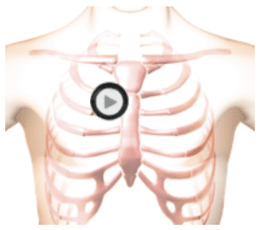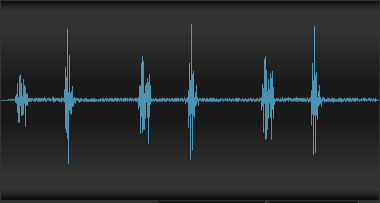Here we present an example of coarctation of the aorta, a congenital abnormality.
This first heart sound is normal. The second heart sound is intensified.
There is diamond shaped murmur occupying most of systole and a high-pitched decrescendo murmur in the first half of diastole.
In the anatomy video you can see a constriction in the descending aorta which is responsible for the systolic murmur.
There is regurgitant flow from the aorta into the left ventricle which causes the diastolic murmur.
The left ventricle wall thickness is increased due to aortic pressure elevation caused by the aortic coarctation.
Coarctation of the Aorta 58 Audio


Coarctation of the Aorta 58 Sounds


Half Speed Coarctation of the Aorta 58 Sounds


Technique

The patient's position should be sitting leaning forward.
Auscultation Tips for Coarctation of the Aorta 58
Systole:Diamond-shaped murmur, possible early systolic ejection soundsS2:Increased intensity
Diastole:high-pitched, decrescendo, early murmur
Sound Wave
Coarctation of the Aorta 58 Video
Play the cardiac movie and observe a constriction in the descending aorta which is responsible for the systolic murmur.
There is regurgitant flow from the aorta into the left ventricle which causes the diastolic murmur.
The left ventricle wall thickness is increased due to aortic pressure elevation caused by the aortic coarctation.
Authors and Sources
Authors and Reviewers
- ECG heart rhythm modules: Thomas O'Brien.
- ECG monitor simulation developer: Steve Collmann
-
12 Lead Course: Dr. Michael Mazzini, MD.
- Spanish language ECG: Breena R. Taira, MD, MPH
- Medical review: Dr. Jonathan Keroes, MD
- Medical review: Dr. Pedro Azevedo, MD, Cardiology
- Last Update: 11/8/2021
Sources
-
Electrocardiography for Healthcare Professionals, 6th Edition
Kathryn Booth and Thomas O'Brien
ISBN10: 1265013470, ISBN13: 9781265013479
McGraw Hill, 2023 -
Rapid Interpretation of EKG's, Sixth Edition
Dale Dublin
Cover Publishing Company -
EKG Reference Guide
EKG.Academy -
12 Lead EKG for Nurses: Simple Steps to Interpret Rhythms, Arrhythmias, Blocks, Hypertrophy, Infarcts, & Cardiac Drugs
Aaron Reed
Create Space Independent Publishing -
Heart Sounds and Murmurs: A Practical Guide with Audio CD-ROM 3rd Edition
Elsevier-Health Sciences Division
Barbara A. Erickson, PhD, RN, CCRN -
The Virtual Cardiac Patient: A Multimedia Guide to Heart Sounds, Murmurs, EKG
Jonathan Keroes, David Lieberman
Publisher: Lippincott Williams & Wilkin)
ISBN-10: 0781784425; ISBN-13: 978-0781784429 - Project Semilla, UCLA Emergency Medicine, EKG Training Breena R. Taira, MD, MPH
-
ECG Reference Guide
PracticalClinicalSkills.com
Coarctation of the Aorta 58 | Auscultation Cheat Sheet with Sounds & Video | #107